So your chickens have stopped laying eggs, and you’re wondering what the heck is going on. Don’t worry – you’re not alone! As a chicken keeper for over 10 years, I’ve experienced this frustrating situation many times. The good news is that most causes of decreased egg production can be identified and fixed.
Let’s dive into the most common reasons why your chickens might have stopped laying eggs and what you can do to get those breakfast baskets filled again.
1. Improper Diet
One of the most common reasons chickens stop laying eggs is diet issues Your hens need proper nutrition to produce eggs, and any disruption to their diet can affect production.
What to look for
- Recent changes in feed brand or type
- Feeding too many treats (follow the 90/10 rule – 90% layer feed, 10% treats)
- Not enough protein (chickens need about 16-20% protein to lay well)
- Lack of calcium for egg shells
How to fix it
- Make sure your hens are on a high-quality layer feed with at least 16% protein
- Provide free-choice oyster shell or crushed eggshells for calcium
- Limit treats to 10% of their diet
- Ensure they have fresh, clean water at ALL times (seriously, even an hour without water on a hot day can disrupt laying)
I once switched my flock from layer pellets to cracked corn, thinking it would be a nice change. Within days, egg production dropped by more than half! When I switched back to a proper layer feed, the eggs returned within a week.
2. Not Enough Daylight
Chickens need 14-16 hours of light daily to maintain good egg production. This is why many hens naturally slow down or stop laying during winter months when daylight hours decrease.
What to look for:
- Decreased egg production coinciding with shorter days
- Complete stop during winter months
How to fix it:
- Add artificial lighting to the coop on a timer (a simple 40-watt bulb works well)
- Set timer to extend daylight hours to 14-16 hours total
However, I personally prefer to let my hens have their natural break during winter. Their bodies need time to rest and recover for the next laying season. You’ll still get occasional eggs, just not daily production.
3. Molting
Molting is when chickens shed their old feathers and grow new ones. This natural process usually happens in fall and can last 8-12 weeks. During this time, hens redirect their energy to feather production instead of eggs.
What to look for:
- Feathers everywhere in the coop
- Patchy-looking chickens with bare spots
- Decreased or stopped egg laying
How to fix it:
- Be patient! Molting is natural and necessary
- Increase protein in their diet during molt (try adding mealworms or black oil sunflower seeds)
- Consider adding a protein supplement like Grubblies to help them through the molt faster
4. Broodiness
When a hen goes broody, she wants to hatch eggs and will sit on the nest constantly. She won’t lay new eggs during this time, which can last 21 days or longer.
What to look for:
- Hen sitting on nest all day and night
- Puffed up feathers when approached
- Territorial behavior, pecking when disturbed
- Making unique broody sounds
How to fix it:
- If you want eggs instead of chicks, you’ll need to “break” her broodiness
- Remove her from the nesting box several times daily
- Place her in a “broody breaker” cage with wire bottom and good airflow
- Keep food and water available but no nesting material
5. Stress
Chickens are sensitive creatures, and stress can definitely impact egg production. Common stressors include:
What to look for:
- Recent predator attacks or threats
- Changes to the flock (adding or losing chickens)
- Moving to a new coop
- Extreme weather conditions
- Too many roosters for your hen count
How to fix it:
- Identify and eliminate the source of stress
- Ensure coop security from predators
- Introduce new flock members gradually
- Maintain consistent routines
- Provide extra comfort during extreme weather
6. Old Age
Just like all females, hens are born with a finite number of eggs they can lay in their lifetime. As chickens age, egg production naturally decreases.
What to look for:
- Hen is 2-3+ years old
- Gradual decline in egg production over time
How to fix it:
- Accept that this is natural and can’t be “fixed”
- Consider adding younger hens to your flock if egg production is important
- Let older hens enjoy their retirement – they still make great bug catchers!
I have a 6-year-old Rhode Island Red who now lays maybe once a month, compared to her daily laying as a young hen. She’s earned her retirement!
7. Illness or Parasites
Sick chickens don’t lay well. Internal parasites, respiratory infections, and other health issues will cause hens to stop laying while their body focuses on healing.
What to look for:
- Lethargy or unusual behavior
- Change in droppings
- Pale comb
- Respiratory symptoms (sneezing, wheezing)
- Constant scratching (external parasites)
- Weight loss
How to fix it:
- Isolate sick birds
- Consult a vet if possible
- Treat for internal parasites regularly as prevention
- Check for external parasites like mites and lice
- Keep the coop clean and dry
8. Extreme Weather
Both hot and cold extremes can cause chickens to stop laying eggs.
What to look for:
- Decreased production during heat waves or cold snaps
- Panting chickens (too hot)
- Fluffed up, inactive birds (too cold)
How to fix it:
- Provide shade, ventilation, and plenty of fresh water during hot weather
- Consider adding frozen treats or frozen water bottles to the coop on hot days
- Insulate the coop (but ensure ventilation) for winter
- Provide extra bedding during cold months
9. Brood Size and Breed Differences
Some chicken breeds are simply better layers than others. Breeds like Leghorns and Rhode Island Reds can lay 250-300 eggs per year, while ornamental breeds might only lay 50-100.
What to look for:
- Lower than expected production from certain breeds
- Inconsistent laying patterns
How to fix it:
- Research breed characteristics before adding to your flock
- Adjust expectations based on breed
- Mix production breeds with ornamental breeds if both eggs and variety are desired
10. Hiding Eggs
Sometimes the problem isn’t that your hens aren’t laying – it’s that they’re laying in secret locations!
What to look for:
- Hens disappearing for periods of time
- Finding random nests outside the coop
How to fix it:
- Keep hens confined to the coop/run for a few days to reset behavior
- Make nesting boxes more appealing (clean, private, comfortable)
- Place fake eggs or golf balls in nesting boxes to encourage laying there
- Check bushes, tall grass, and hidden corners of your property
11. Rooster-to-Hen Ratio
Too many roosters can stress your hens and cause a decrease in egg production.
What to look for:
- Hens with missing back feathers
- Hens hiding or avoiding roosters
- Fighting among roosters
How to fix it:
- Maintain a ratio of 1 rooster per 8-10 hens
- Consider rehoming extra roosters
- Use hen saddles to protect backs from mating damage
12. Fear of Predators
Even if predators haven’t directly attacked your flock, their presence can cause stress that impacts egg laying.
What to look for:
- Nervous behavior
- Reluctance to free range
- Decreased egg production after predator sightings
How to fix it:
- Reinforce coop security
- Consider using trail cameras to identify lurking predators
- Remove attractants like spilled feed
- Consider adding a livestock guardian dog or other protection
The Bottom Line
If your chickens have stopped laying eggs, don’t panic! Take a systematic approach to identify the cause:
- Check their diet and water
- Consider the season and daylight hours
- Look for signs of molting or broodiness
- Evaluate stress factors and coop conditions
- Consider your hens’ age and breed characteristics
Most egg-laying issues can be resolved with proper care, patience, and understanding of your chickens’ natural cycles and needs. And remember – even non-laying hens are wonderful companions who provide pest control, compost, and endless entertainment!
Have your chickens ever stopped laying? What was the cause and how did you fix it? I’d love to hear your experiences in the comments below!

Change to a New Coop or Nesting Boxes
Chickens are all about their routine. Moving to a new coop or nesting boxes could cause the hens to stop laying eggs.
If you have to move them or change their routine, it is best to do it all at once and give it some time. Eventually, your hens will adjust.
One of the significant causes for chickens to stop laying eggs is illness or disease. The best way to treat illness and disease is to prevent it in the first place, but if your chickens get ill or diseased, remove them from the flock and isolate them.
Try giving your sick hens magic water. This mixture combines apple cider vinegar, honey, garlic, and water. Magic water will help boost the immune system. Adding a fermented feed to her diet is also a good idea. This mixture can be given to your flock as a preventative measure every so often.
We use magic water for raising our turkeys and raising our meat chickens. We have found it to help keep all of our birds healthy.
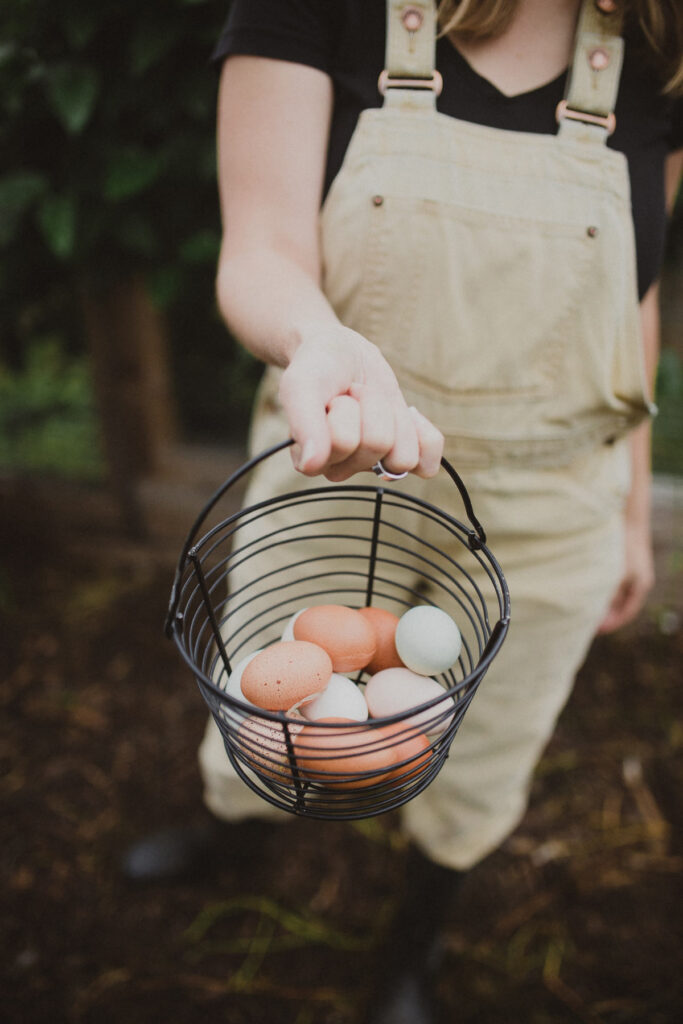
Why Chickens Stop Laying Eggs
Egg-laying chickens are relatively easy to raise, but what do you do when your hens stop laying eggs? Here are 20 common reasons your hens may stop laying eggs and solutions to bring back production.
One reason why chickens stop laying eggs is if the days are getting shorter. Come late fall and winter, a hen’s egg production will slow down because there are not enough hours of daylight to stimulate her ovaries.
Using an artificial light source on a timer will help solve this issue, but I recommend giving your hens at most 14 hours of light. It’s important to remember that the winter months are a good time for our hens (and the entire farm) to slow down and rest; it’s nature’s natural way of taking a break.
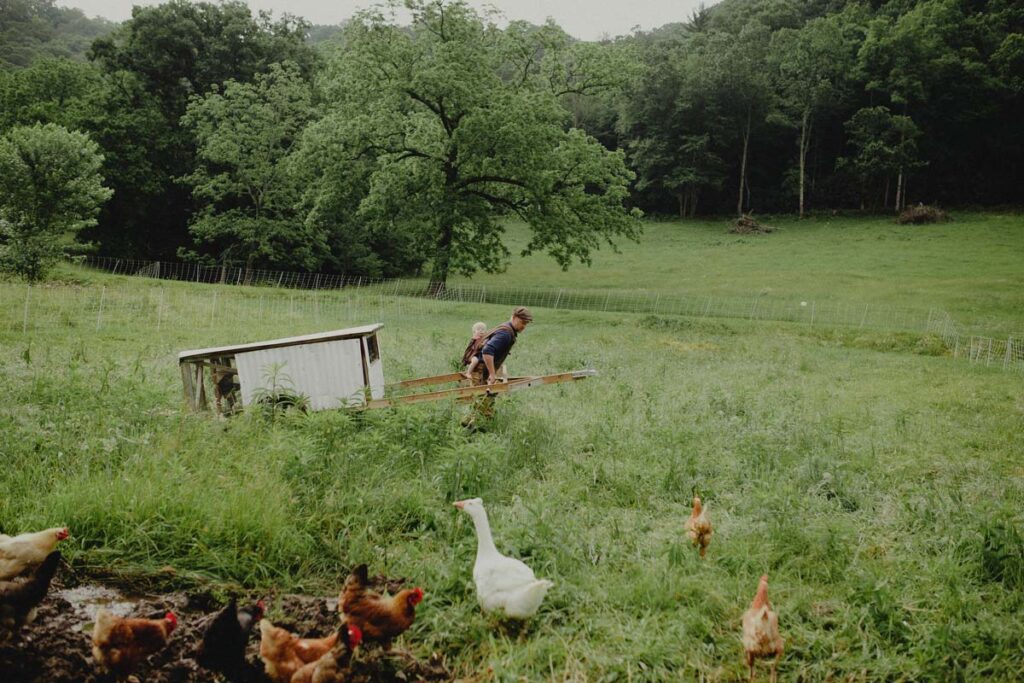
Another cause for decreased egg production is that they are molting. Molting is the process a bird goes through when it sheds old feathers to make room for new feathers, which usually happens in the fall.
Hens will stop laying eggs when molting because their energy will be making feathers instead of eggs. Adding extra protein into their diet is one way to speed up the process of molting. Sunflower seeds and meat scraps are good sources of protein to feed a molting hen.
You can check out this post to learn more about the nutritional needs of chickens, and in this post, I share my best tips on what to feed chickens other than grain.
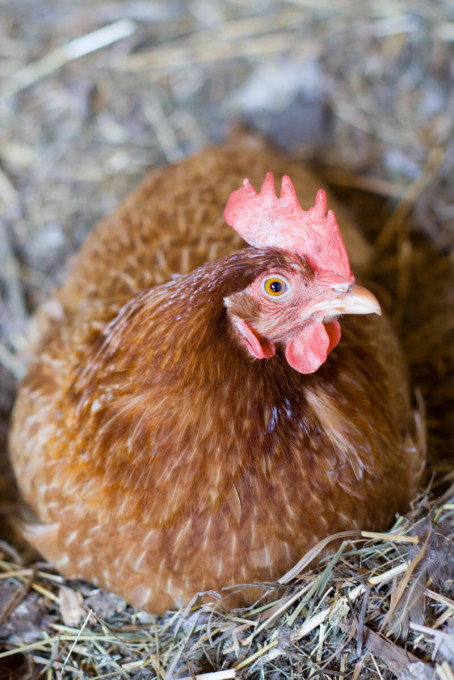
Brooding can cause your backyard chicken to stop laying eggs. Brooding is when a hen wants to sit on her eggs in an attempt to hatch them. Brooding can last 3 to 5 weeks; if your hen is sitting on unfertilized eggs, it will not continue laying or producing eggs.
One way to break the brooding phase is to regularly gather the eggs from her nesting area and block off the nest boxes.
If this doesn’t work, you may have to move her to a crate with no nesting material, but make sure she has food and fresh water. Keep her there for a couple of days; it should break the brooding instinct.
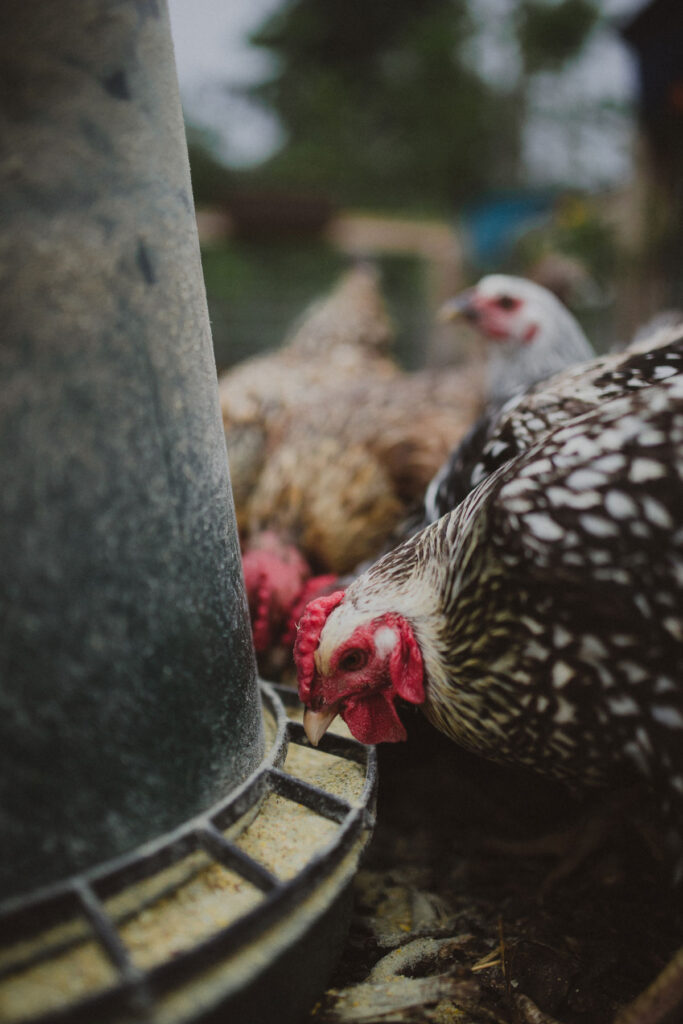
Hens sometimes eat their eggs when they are calcium deficient or out of complete boredom. You don’t want them eating your breakfast.
You may see signs that your hen is eating eggs if there is yolk spilled in places, but often there won’t be any signs that they are eating their eggs.
A great way to prevent this is to make sure your chickens have a healthy diet and calcium supplements. A simple way to provide extra calcium in your hen’s diet is to crush eggshells into their feed. Other great calcium supplements include oyster shells and aragonite.
Another way to prevent egg eating is to keep the nesting boxes above eye level, put soft bedding in her nesting box, and collect the eggs several times a day until they break their bad habit.
They also may be eating their eggs because they are bored. When your hens become bored, they start attacking and eating their eggs, allowing you to collect less usable eggs.
A way to prevent boredom is to give them space to move around in a coop. Use a chick shaw to move your chicken coop around the farm so they are not bored of the location. This also allows your hens to scratch and eat in a clean area.
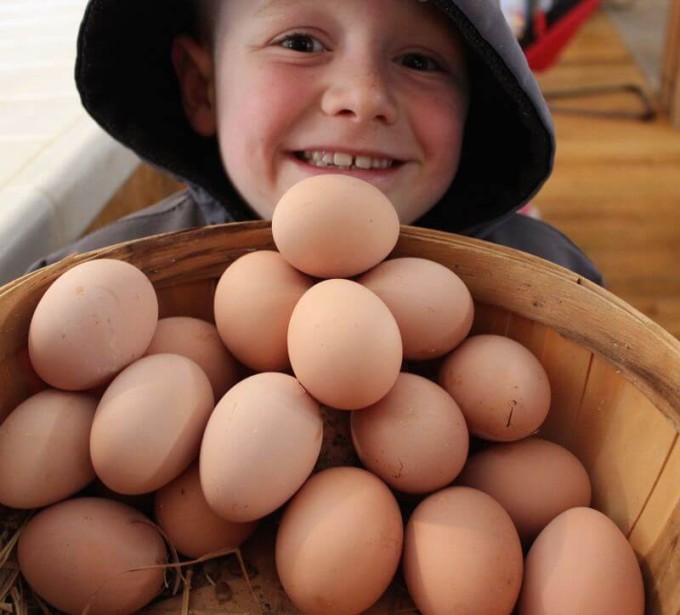
Snakes, skunks, rats, coyotes, owls, and hawks will keep a close eye on your chickens. Just the presence of predators will stress your hens out and cause a problem with egg production.
A great solution is to understand the basic needs of a chicken coop and have a well-designed chicken coop that keeps predators out and your hens safe. Make sure any vented or open space is covered with 1/2-inch wire mesh so predators cannot get into the coop.
If you have a predator problem, read this post to identify what predator killed your chicken.
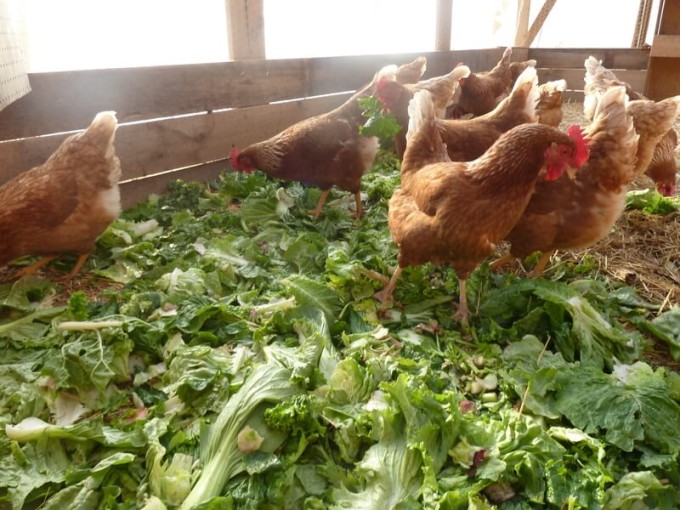
Another reason hens stop laying eggs is that they could be egg-bound. Egg bound is when an egg is stuck in its oviduct. This could be deadly if not noticed immediately and can occur if you have an older or unhealthy hen.
One way to prevent egg binding is to ration their feed to avoid obesity. No more than 1/3 pound of food a day. Offer plenty of green feed leaves, herbs, grass, and calcium supplements.
Be sure to provide open space for your chickens to roam freely for exercise. Another factor that could cause egg binding is artificial light. It can affect your hen’s biological system.
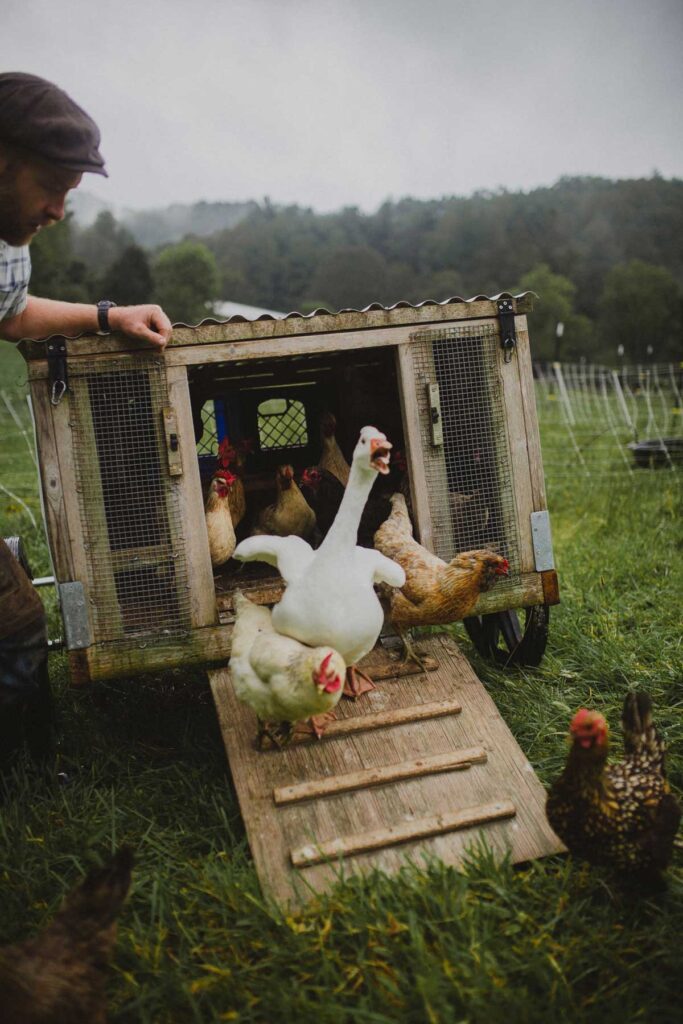
An overcrowded chicken coop will cause stress on your chickens and cause the hens to stop laying eggs.
When possible, a single hen should have a minimum of 3 square feet inside and 10 square feet outside the coop.
Assimilating a new chicken into your flock will disrupt the flock, which can cause stress. Also, taking a chicken out of the flock can cause disruption.
All we can do when adding or taking away chickens is be patient. It takes a little time for your chickens to establish a pecking order. We have found that moving new chickens in or taking chickens out is best done at night.

Chickens Not Laying Eggs For Months! The Causes
FAQ
Why do chickens stop laying eggs?
Understanding why chickens stop laying eggs is the first step to solving the problem. From seasonal shifts to nutritional needs and even stress, there are several reasons your hens might be taking an unscheduled break. Let’s walk through the common causes, how to troubleshoot them, and most importantly—how to get your girls laying again. 1.
Why are my hens laying less eggs?
Another reason for decreased egg production is over-treating and over-supplementing hens. Added treats and scraps can dilute the nutrients in a complete layer feed so the hen is less able to produce eggs consistently. Laying hens need certain nutrients for consistent health and performance.
Why is my chicken laying a lot of eggs?
Chickens can be susceptible to various diseases and parasites that can significantly impact their egg-laying abilities. One of the most common issues is mites and lice infestations. These external parasites feed on a chicken’s blood, causing discomfort, stress, and weakened immune systems.
Why do hens stop laying?
Hens stop laying due to molting. Once a hen reaches one year of age, she will molt once a year for the rest of her life. This molting cycle enables the hen to replace her feathers each year, which enhances her health and ensures she is prepared for the winter months.
Why is my broody hen not laying eggs?
A broody hen will stop laying entirely. If you find your hens not laying eggs and constantly nesting with puffed feathers and a defensive attitude, broodiness is likely the reason. What to do: Break the broody cycle by placing her in a separate, wire-bottom crate (a “broody breaker”) for a few days with food and water but no nesting materials.
Do chickens slow down laying eggs?
It’s not uncommon for chickens to slow down or take breaks from laying eggs, especially during periods of stress or poor nutrition. To maintain optimal egg production, ensure your girls are getting a balanced diet that includes essential nutrients like calcium, protein, and vitamins.
How do I get my chickens to lay eggs again?
Will chickens stop laying if the coop is dirty?
What to feed chickens that have stopped laying eggs?
What season do chickens stop laying eggs?
